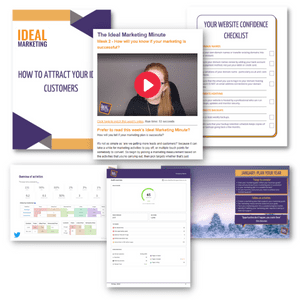 Whether your business is flying high, or you are struggling to find your feet in a crowded market, running a small business takes time, energy and commitment. When tackling the never-ending to-do list, marketing is often an area that never seems to get addressed, due to the more pressing demands that crop up day-to-day. And as a small business owner, you may be asking yourself whether marketing is even worth doing for a business like yours and if it is, what should you be concentrating your efforts on?
Whether your business is flying high, or you are struggling to find your feet in a crowded market, running a small business takes time, energy and commitment. When tackling the never-ending to-do list, marketing is often an area that never seems to get addressed, due to the more pressing demands that crop up day-to-day. And as a small business owner, you may be asking yourself whether marketing is even worth doing for a business like yours and if it is, what should you be concentrating your efforts on?
The truth is the vast majority of small businesses can benefit from a well-researched and planned marketing strategy. Here’s why…
What is marketing?
Marketing is all about getting your product seen, engaged with and ultimately purchased by your potential customers. For start-ups, it’s about getting your name out there and gaining customers, and for longer-established companies, it’s about building on what you’ve already achieved to sustain your success and grow your business.
Rather than a quick fix to boost sales, marketing should always be seen as a long-term strategy to support and grow your business; an activity that will constantly feed and nourish your business as opposed to being a one-off intervention that you hope will fix a problem. Whether that investment involves your time or paying an agency or freelancer, marketing should be an integral component of your activities as a business.
One common question is what type of marketing is it best to concentrate on?. The answer to this question is unique to you and will be dictated by the type of business you are as well as your size, but your marketing strategy may include the following:
- SEO
- Digital advertising
- PR
- Website
- Copywriting
- Social media
- Email marketing
- Blogging
- Vlogging
- Podcasts
- Direct mail
- Public speaking opportunities
- Entering (and winning!) awards
With all the options available in the age of digital marketing, figuring out where to begin can be a barrier to getting started with marketing your small business.
One good way to start is with some competitor research to see what is working for similar businesses to yours. It’s also important to think about how best to reach your target audience. For example, in terms of social media, Instagram may be the best way to engage with Generation Z and Millennial customers, while Generation X target audiences may spend more time on Facebook.
If you’re doing your own marketing, you won’t get up and running with a comprehensive strategy overnight. But by starting small with activities such as posting twice a week on social media, committing to sending out a monthly newsletter or contacting the local press when you have an exciting piece of news to share, you can start to get a feel for what will work for you.
What’s the importance of marketing to small business owners?
One reason why some small business owners don’t engage with marketing is they assume they will never be able to compete with larger companies with hefty marketing budgets and in-house marketing teams. However, the truth is small businesses can not only compete with larger rivals, they can also beat them at their own game. Here’s why…
Cost
The beauty of social media and email marketing is that they are a free or low-cost way to engage with your customers. As a result, getting in front of the people you want to buy from your brand has never been more affordable. This means the playing field has now levelled in terms of competing with organisations with bigger budgets. And the fact that these companies will inevitably have far more followers than you will be irrelevant if you are engaging with the right people. When it comes to numbers, who you reach is always more important than how many you reach.
Before you embark on any marketing activity, it’s important to set a budget and in doing so ask yourself how much is a client worth to you in terms of what you are willing to spend in order to acquire them? Businesses who advertise in a local newspaper and gain five new clients on the back of that have a clear idea of cost per customer acquisition. However, with marketing, it’s not always so clear cut. For this reason, it’s important to do the following:
- Research and implement the best marketing methods for you – this is where the expertise of an agency will come into its own.
- Track your marketing with methods like Google Analytics, social media insights, dedicated phone numbers and email segmentation to see what’s working and what needs to be improved.
Targeting
One advantage small businesses have over their larger competitors is that they really know their customers. For example, who is likely to know their clients better – the owner of a small boutique who chats to the loyal customers she serves every day, or the marketing director of a household name high street chain?
The specific, almost personal knowledge small businesses can obtain about their customers is gold dust when it comes to marketing to them. These days, most potential customers make their decisions based on more than just price, and the information they give you can be harnessed in your marketing activities to create customer personas to inform a targeted marketing strategy, based on the niche insights only you have the opportunity to uncover.
Fun
Like any aspect of running your business, a successful marketing strategy involves hard work and consistent effort. However, that doesn’t mean it can’t be interesting as well as rewarding. In addition to the increase in profits marketing can bring, winning an award, seeing a news story about an event you’re running in the local paper or interacting with happy customers on social media is a great way to remind yourself what you stand for and how much you have achieved as a business. Very often, successful marketing is a public celebration of success.
Who should do your marketing?
Whether you do your marketing in a hands-on way or outsource it to a freelancer or agency, as the person who knows your business best, you should always be the driving force behind it.
However, even if you have some of the skills to do marketing tasks yourself, you also need to have the time to do the work consistently – and as we know, spare time is an unfamiliar concept to most small business owners!
If you have a specific job in mind, such as SEO research and optimisation or social media posting, then working with a freelancer can be a great solution. The flexibility of using a freelancer can be particularly beneficial when budget concerns are important. However, that flexibility works both ways as in-demand freelancers may not always have the availability you need.
For many small businesses, working with a marketing agency on a retainer basis works well. Again, this can be a specialist agency who will work with you on one area you have decided to focus on, or a full-service agency, whose wide range of expertise you can tap into as a remote marketing department.
Whichever size or style of agency you opt for, the key things to look for are a targeted strategy based on audience research and a commitment to regular reporting to prove what is working and to make changes where improvements are required or new needs for your business arise.
Take the first step to getting your marketing on track
Get your small business marketing plan on track today by claiming your free no-obligation marketing consultation from The Ideal Marketing Company. Alternatively, call us on 01858 374 170 or email jess@idealmarketingcompany.com

Louise is an experienced and versatile copywriter whose passion is bringing any subject to life through the written word. She thrives on using her imaginative approach to identify and implement exciting PR opportunities for clients. A career spent coming up with creative content for tight deadlines in consumer magazine journalism and PR means Louise doesn’t know the meaning of the term ‘writer’s block!’







